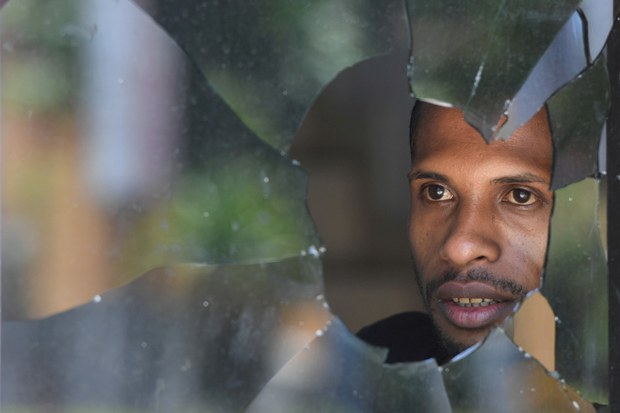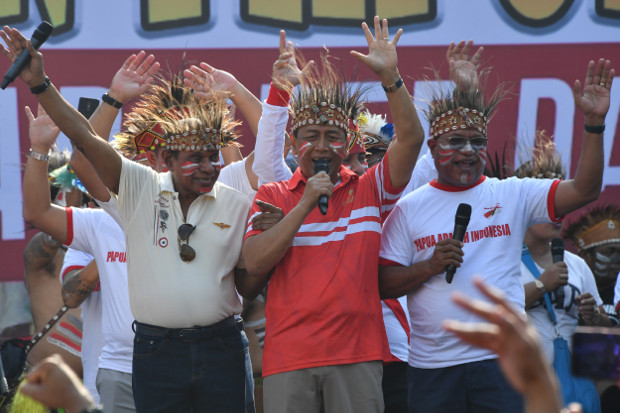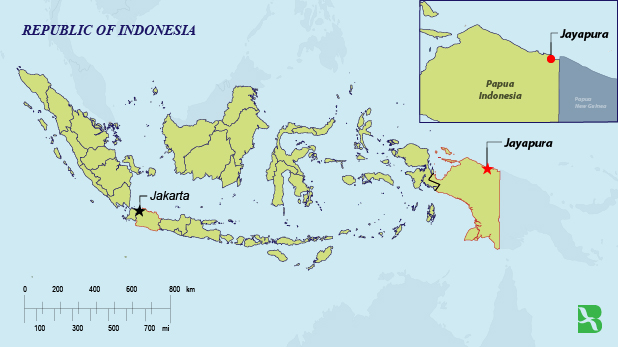Indonesia Restores Internet Access in Parts of Papua, West Papua Provinces
2019.09.05
Jakarta
 A man looks through a broken window after a riot in Jayapura, capital of the Indonesian province of Papua, Aug. 31, 2019.
A man looks through a broken window after a riot in Jayapura, capital of the Indonesian province of Papua, Aug. 31, 2019.
The Indonesian government partially lifted an internet blockage in parts of Papua and West Papua provinces on Thursday as calm started returning to the region after more than two weeks of violent protests left at least 13 people dead.
Officials imposed the blackout on Aug. 21 to stop what they called fake news from spreading after protesters torched government buildings during anti-government rallies.
“After consulting relevant authorities, we consider the security situation to be favorable, so we decided to lift the internet restrictions,” Ferdinandus Setu, spokesman for the Communications and Information Technology Ministry, told BenarNews.
He said access remained restricted in 13 regencies, but the internet blackout could be lifted in the coming days.
On Aug. 17, anti-riot police forced their way into a Papuan student dormitory in Surabaya, Indonesia’s second-largest city, and briefly detained 43 students after accusing them of disrespecting the national flag by throwing it into a sewer.
Activists said security personnel hurled racist taunts at them including “monkeys” and “pigs.”
Two days later, arson attacks on government buildings in West Papua prompted the government to send 1,500 police and soldiers to the province.
Officials in Papua said at least 13 people were killed, including eight civilians and a soldier in Deiyai on Aug. 28 when security forces clashed with protesters armed with arrows and other crude weapons.
The protests were sparked by perceived harsh and racist treatment of Papuan students by security forces and vigilante groups on Java, the country’s most populous island, activists said.
Papua police spokesman Ahmad Mustofa Kamal said five more people had been arrested for allegedly carrying crude weapons during recent rallies, bringing to 69 the number suspects who have been detained. Police confiscated 40 slingshots, dozens of sharp iron bars, arrows and knives.
On Wednesday, police in East Java named a prominent human rights lawyer, Veronica Koman, as a suspect for allegedly inciting unrest. Police said some messages and images that she had uploaded on Twitter contained misinformation and inflamed anger in Papua.
On Thursday, national police chief Gen. Tito Karnavian accused the separatist umbrella group United Liberation Movement for West Papua (ULMWP) and the pro-referendum National Committee of West Papua (KNPB) of orchestrating the anti-government protests in the region.
“What has happened in Papua was designed by these groups for a specific purpose – to create chaos,” Tito told the state-run news agency Antara in Jayapura on Thursday.
He said the protests were intended to draw international attention ahead of a meeting of the United Nations Human Rights Commission in Geneva on Sept. 9. Tito claimed the groups incited unrest by spreading misinformation to force the U.N. General Assembly to discuss the Papua issue when it convenes on Sept. 23 and 24.
“The ULMWP and KNPB are responsible for the various events that have taken place. We have the names [of suspects] and legal action will be taken,” Tito said, adding that security and order had been restored in the two provinces.
ULMWP chairman Benny Wenda, who lives in exile in Britain, challenged Tito’s allegations.
“Rather than address our cry for freedom, the Indonesian government prefers to launch propaganda to divert attention,” Wenda said in a statement sent to BenarNews.
“Rather than uphold our right to self-determination, [security minister] Wiranto is forming militia groups, trying to turn Indonesian settlers in West Papua against us – just as he did in East Timor,” Wenda said.
Wiranto was the Indonesian armed forces commander in August 1999 when East Timor voted to break away from Jakarta in a U.N.-sponsored ballot, which was preceded and followed by violence blamed on army-backed pro-Indonesian militiamen.

Chief's statements challenged
Suarbudaya Rahadian, a spokesman for the Civil Society Coalition for Democracy, called Tito’s accusations against pro-independence groups reckless.
“The protests were triggered by the feeling of being demeaned and insulted. There need not be a mastermind for such action,” he told BenarNews.
He urged the police chief to provide evidence to back up the allegations.
“Such claims are easy to make but should not have been made in this volatile situation,” he said.
Meanwhile, rights activists said police were holding six Papuan students who took part in a protest outside the presidential palace in Jakarta on Aug. 28 when banned separatist Morning Star flags were displayed.
Suarbudaya said one of the activists, Surya Anta, had been held in a windowless isolation cell in the Mobile Brigade headquarters in Depok, south of Jakarta, where guards have been playing Indonesian patriotic songs non-stop.
“I visited him yesterday. He was isolated and separated from the others and the condition was inhumane,” Suarbudaya said. He urged police to release the student activists.
“They are accused of treason, and that is very dangerous. All they did was speak out against injustice experienced by the people of Papua,” he said.
The Papua region, which makes up the Indonesian half of New Guinea island, was incorporated formally into Indonesia in 1969 following a U.N.-administered ballot known as the Act of Free Choice. Many Papuans and rights groups said the vote was a sham because it involved only 1,000 people.
The Free Papua Movement (OPM) launched a movement to establish an independent state for the region in 1965, three years after Dutch colonizers ceded sovereignty over the territory to Indonesia. OPM has since waged a low-level separatist insurgency against Jakarta’s rule.
Since then, the Indonesian military has been accused of gross human rights violations during decades of anti-insurgency campaigns. Rights activists have said impunity for violators is the norm.








